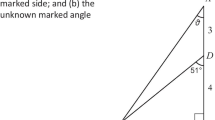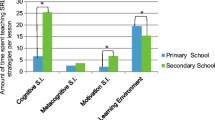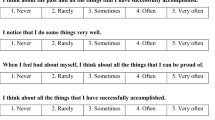Abstract
Considering that learning belongs primarily to the student, student self-regulation capacity is essential to ensure mathematics learning. Poor self-regulation limits students’ mathematical performance and their ability to participate fully in classroom discourse. By enhancing self-regulation it is possible to improve students’ equitable participation in mathematics. In this paper, we present a study aimed at understanding the development of the self-regulation capacity of middle school students in mathematics, throughout an observed teaching intervention, in which is developed regular work to promote internalisation of the assessment criteria, whole-class mathematics discussions regulated by social norms and the assessment criteria, and written self-assessments tasks. Following qualitative research methodology, data collection sources were classroom observation, interviews, questionnaires, and collection of documents. Data analysis had a strong interpretive foundation, making use of a system of categories defined during the process, based on the theoretical framework. Throughout the teaching intervention, students walked towards the internalisation of the assessment criteria, improved their performance in collective discussions, and developed their self-regulation capacity, following an individualized and non-linear pathway. Although equity concerns were partially addressed, the development of self-regulation capacity was not consistent in all students. This suggests that more could have be done to provide quality mathematics education for each and every student.

Similar content being viewed by others
References
Allal, L. (2010). Assessment and the regulation of learning. In P. Peterson, E. Baker & B. McGaw (Eds.), International encyclopaedia of education (Vol. 3, pp. 348–352). Oxford: Elsevier.
Andrade, H. (2013). Classroom assessment in the context of learning theory and research. In J. McMillan (Ed.), The SAGE handbook of research on classroom assessment (pp. 17–34). Thousand Oaks: Sage Publications.
Andrade, H., & Valtcheva, A. (2009). Promoting learning and achievement through self-assessment. Theory Into Practice, 48(1), 12–19. https://doi.org/10.1080/00405840802577544.
Artigue, M., & Blomhøj, M. (2013). Conceptualizing inquiry-based education in mathematics. ZDM - The International Journal on Mathematics Education, 45, 797–810. https://doi.org/10.1007/s11858-013-0506-6.
Black, P., & Wiliam, D. (1998). Assessment and classroom learning. Assessment in Education, 5, 7–71.
Brookhart, S., Andolina, M., Zuza, M., & Furman, R. (2004). Minute math: An action research study of student self-assessment. Educational Studies in Mathematics, 57, 213–227. https://doi.org/10.1023/B:EDUC.0000049293.55249.d4.
Brown, G., & Harris, L. (2013). Student self-assessment. In J. McMillan (Ed.), The SAGE handbook of research on classroom assessment (pp. 367–393). Thousand Oaks: Sage.
Brown, G., & Harris, L. (2014). The future of self-assessment in classroom practice: Reframing self-assessment as a core competency. Frontline Learning Research, 2(1), 22–30. https://doi.org/10.14786/flr.v2i1.24.
Butler, R. (2011). Are positive illusions about academic competence always adaptive, under all circumstances: New results and future directions? International Journal of Educational Research, 50(4), 251–256. https://doi.org/10.1016/j.ijer.2011.08.006.
Cohors-Fresenborg, E., Pundsack, F., Sjuts, J., & Sommer, N. (2010). The role of metacognitive monitoring in explaining differences in mathematics achievement. ZDM - The International Journal on Mathematics Education, 42, 231–244. https://doi.org/10.1007/s11858-010-0237-x.
Colbert, P., & Cumming, J. (2014). Enabling all students to learn through assessment. In C. Wyatt-Smith, V. Klenowski & P. Colbert (Eds.), Designing assessment for quality learning (pp. 211–231). Berlin: Springer.
Creswell, J. (2012). Educational research. Planning, conducting and evaluating quantitative and qualitative research (4th edn.). Boston: Pearson Education.
Field, S., Kuczera, M., & Pont, B. (2007). No more failures: Ten steps to equity in education. Paris: OECD.
Fontana, A., & Frey, J. H. (1994). Interviewing: The art of science. In N. Denzin & Y. Lincoln (Eds.), Handbook of qualitative research (pp. 361–374). Thousand Oaks: Sage.
Hattie, J., & Timperley, H. (2007). The power of feedback. Review of Educational Research, 77(1), 81–112. https://doi.org/10.3102/003465430298487.
Jurdak, M. (2014). Socio-economic and cultural mediators of mathematics achievement and between-school equity in mathematics education at the global level. ZDM - The International Journal on Mathematics Education, 46, 1025–1037. https://doi.org/10.1007/s11858-014-0593-z.
Levin, B. (2004). Approaches to equity in policy for lifelong learning. Paper presented at the American Education Research Association annual meeting. San Diego, May.
Mathematical Sciences Education Board & National Research Council [MSEB/NRC] (1993). Measuring what counts: A conceptual guide for mathematics assessment (pp. 201–223). Washington: National Academy Press.
Montenegro, E., & Jankowski, N. (2017). Equity and assessment: Moving towards culturally responsive assessment (Occasional Paper No. 29). Urbana: University of Illinois and Indiana University, National Institute for Learning Outcomes Assessment.
NCTM (2014). Principles to actions. Ensuring mathematical success for all. Reston: NCTM.
Nunziati, G. (1990). Pour construire un dispositif d´évaluation formatrice. [To build a formative assessment system]. Cahiers Pédagogiques, 280, 47–62.
OECD (2012). Equity and quality in education: Supporting disadvantaged students and schools. Paris: OECD Publishing.
Panadero, E., & Alonso-Tapia, J. (2013). Self-assessment: theoretical and practical connotations. Electronic Journal of Research in Educational Psychology, 11(2), 551–576. https://doi.org/10.14204/ejrep.30.12200.
Sadler, R. (1989). Formative assessment and the design of instructional systems. Instructional Science, 18, 119–144.
Santos, L., & Cai, J. (2016). Curriculum and assessment. In A. Gutiérrez, G. Leder & P. Boero (Eds.), The second handbook in the psychology of mathematics education (pp. 153–185). Rotterdam: Sense Publishers.
Santos, L., & Semana, S. (2015). Developing mathematics written communication through expository writing supported by assessment strategies. Educational Studies in Mathematics, 88(1), 65–87. https://doi.org/10.1007/s10649-014-9557-z.
Smith, J., & Smith, L. (2014). Developing assessment tasks. In C. Wyatt-Smith, V. Klenowski & P. Colbert (Eds.), Designing assessment for quality learning (pp. 123–136). Berlin: Springer.
UNESCO (2012). Challenges in basic mathematics education. Paris: United Nations Educational, Scientific and Cultural Organization. (http://unesdoc.unesco.org/images/0019/001917/191776e.pdf).
Valero, P. (2007). A socio-political look at equity in the school organization of mathematics education. ZDM - The International Journal on Mathematics Education, 39, 225–233. https://doi.org/10.1007/s11858-007-0027-2.
Wiliam, D. (2007). Keeping learning on track: Formative assessment and the regulation of learning. In F. K. Lester Jr.. (Ed.), Second handbook of mathematics teaching and learning (pp. 1053–1098). Greenwich: Information Age Publishing.
Zimmerman, B. (2011). Motivational sources and outcomes of self-regulated learning and performance. In B. Zimmerman & D. Schunk (Eds.), Handbook of self-regulation of learning and performance (pp. 49–64). New York: Routledge.
Author information
Authors and Affiliations
Corresponding author
Appendix 1
Rights and permissions
About this article
Cite this article
Semana, S., Santos, L. Self-regulation capacity of middle school students in mathematics. ZDM Mathematics Education 50, 743–755 (2018). https://doi.org/10.1007/s11858-018-0954-0
Accepted:
Published:
Issue Date:
DOI: https://doi.org/10.1007/s11858-018-0954-0




